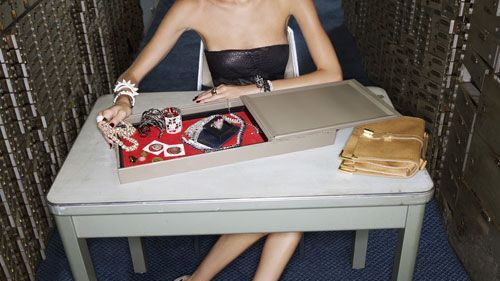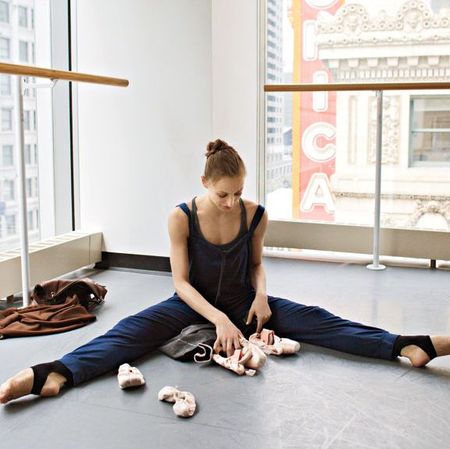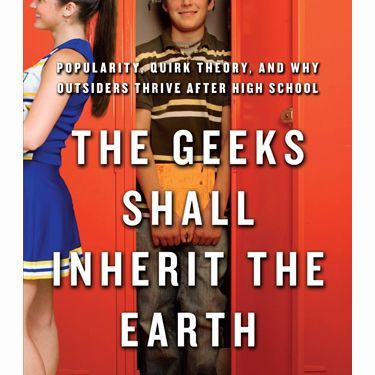How to Save Like French Women
What living in the style capital of the world taught one American about scaling back.


It's sale time at the very chic, very tiny, and very expensive Eres shop in Paris—the moment when cool French women lose their heads. Eres makes the most beautiful and flattering bikini in the world. It's a French institution, like the YSL Muse bag or K Jacques sandals. But even if Eres is renown for coaxing impressive cleavage and bums from even the most, ahem, intractable figures, here in France, we are, like everyone else, in the midst of a bleak economic crisis. Unemployment hovers around 10 percent, and there are rumors of a double-dip recession. Sound familiar?
So how does a chic French woman weather the storm? She waits in line, carefully sorting through boxes of silky maillots and elaborate bottoms, until she finds the one perfect bikini, unlike me, the American next to her, waiting to pay for three, none of which I'm entirely happy with.
That's the secret of the credit crunch in France: What you don't have in the bank, you simply don't spend. Last year President Nicolas Sarkozy bragged that France would weather the economic crisis better than the Anglo-Saxons. He was right. Credit cards don't really exist here—it's more of a debit-card nation. Which means you don't live, as a French friend of mine calls it, "on the never never." You buy one timeless Prada dress on sale instead of a truckload of junk that will last one season.
For an American who has lived most of her life in Britain—where in 1991 I got a no-money-down mortgage for a Notting Hill apartment and lived on overdraft for years—it has been a steep learning curve. But in some ways, I'm grateful for it. I own my own home in Paris; I'm not in debt as badly as some of my American friends. I stopped spending wildly a while ago.
Years ago I remember walking into the Azzedine Alaïa boutique and snapping up two dresses, a pair of trousers, and a skirt. I cannot remember what it cost, but I am sure that it would have fed my household for six months. Now I think carefully and actually write down (sometimes) what I spend. "Shop in your cupboard," my mother always told me, looking in dismay at my endless shopping bags. "You will be happier. It's less complicated."
The current situation has made me realize just how right she was. Somehow the streamlined economic life is lighter. It's easier getting dressed in the morning when you have fewer clothes, but you like all of them. Who needs 10 pairs of jeans and 40 white shirts, anyway? Or, as the case may be, a dozen expensive bikinis, none just right?
Stay In The Know
Get exclusive access to fashion and beauty trends, hot-off-the-press celebrity news, and more.
-
 Prince Harry Wasn't Informed About King Charles's Hospitalization
Prince Harry Wasn't Informed About King Charles's Hospitalization"It looks like the duke only found out about his father's latest health update through the media."
By Amy Mackelden Published
-
 Jennifer Lawrence Styles a $7,500 Outfit With $100 Sneakers
Jennifer Lawrence Styles a $7,500 Outfit With $100 SneakersThe actress paired Prada and Celine with her $100 footwear.
By Amy Mackelden Published
-
 Meghan Markle and Her Makeup Artist Confirmed All Her Royal Wedding Beauty Products
Meghan Markle and Her Makeup Artist Confirmed All Her Royal Wedding Beauty ProductsAnd yes, you can shop them all here.
By Kayleigh Roberts Published
-
Smart, Sexy Money
Live your richest life no matter what you earn with these no-fail tips from LearnVest's money guru Alexa von Tobel.
By Alexa von Tobel Published
-
 The Rich Girl's Money Rules to Live By
The Rich Girl's Money Rules to Live ByWant to earn more? Spend smarter? Live a glamorous life? Take charge of your money with our financial cheat sheet.
By Sophie Moura Published
-
 What It Costs to Be Me: U.S. Edition
What It Costs to Be Me: U.S. EditionWomen from across the nation reveal their annual income, how they spend their money, and what they love to splurge on!
By Lea Goldman Published
-
 Real-Life Revenge of the Nerds
Real-Life Revenge of the NerdsA new book suggests that teenage outcasts are the most likely to succeed as adults.
By Abigail Pesta Published
-
Are Women Too Emotional at Work?
Now that women make up the bulk of the workforce, should we brace ourselves for more tears at the office?
By Lea Goldman Published
-
 What Does Your Desk Say About You?
What Does Your Desk Say About You?Whether it's a shrine to your kitty or clean enough to conduct surgery in, your workspace makes a big statement. But are you sure it's the one you want to make?
By Lea Goldman Published
-
 What It Costs to Be Me
What It Costs to Be MeFive women from around the world reveal how they spend their money, what they're saving for — and their most expensive shoes!
By Lea Goldman Published
-
 Shelby Knox
Shelby KnoxThe next Gloria Steinem
By Sophie Moura Published
